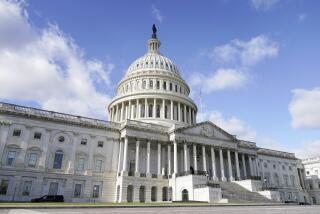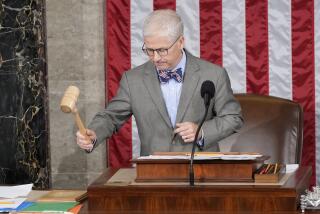Debt limit debate volatile for Republicans
Reporting from Washington — When freshman Republican Rep. Tom Marino was making his bid for Congress last fall, ads run on his behalf by the House Republican campaign apparatus attacked his opponent for voting to raise the nation’s debt limit.
The Democratic incumbent should “apologize” to children for saddling them with debt, the TV commercial said, leaving the implication that Marino would not cast such a vote if Pennsylvania voters sent him to Washington.
Now, however, Marino is among dozens of Republican lawmakers that House GOP leaders must persuade to support an increase in the debt ceiling to avert potential economic disarray.
This week, House Speaker John A. Boehner’s leadership team is holding “listening sessions” as lawmakers return to Washington from a two-week recess, hoping to school them in the economic reality of the situation. The sessions also will gauge their support for extracting spending cuts in exchange for the unpopular vote.
But as the races last fall showed, many in the Republican leadership helped foster the political climate that has made this spring’s debt debate perhaps the most difficult Washington has ever faced.
And underscoring the volatility of the issue, the GOP now faces mounting pressure from the conservative right, which helped propel the party to a House majority last year.
“We are calling on Speaker Boehner to say ‘Hell no!’ to the cacophony from the left that demands we quietly raise the debt ceiling,” Amy Kremer, chairwoman of Tea Party Express, said last week. “Have courage, remember the ‘tea party,’ and fight for us!”
The debate over the upcoming vote to lift the debt limit is likely to consume Congress as the nation approaches its borrowing capacity of $14.3 trillion, which it is expected to hit by mid-May.
This week, Vice President Joe Biden will convene a meeting of congressional leaders to begin negotiations over the types of budget reforms that would be needed to secure the congressional vote.
Republicans expect to head into the talks confident that their opposition to simply allowing more spending already has shifted the debate.
“If we’re going to deal with the debt ceiling, we’re going to need to get real cuts, real reforms,” said Boehner spokesman Michael Steel.
The White House has indicated it is willing to consider budget reforms as a condition for congressional approval, leaving President Obama at odds with 114 House Democrats who have insisted on a “clean” debt limit vote, with no provisions attached.
The debate ahead will revolve around the details: whether the vote should be linked to further spending cuts, as Republicans prefer, or more broadly tied to a trigger-like mechanism that would force both tax and spending changes, as other Democrats want.
“The debt ceiling vote is about one thing: affirming that America pays its bills,” said Rep. Peter Welch (D-Vt.), in a letter signed by the 114 Democrats.
“To do otherwise, or to threaten to do so, or to leverage our duty to pay our bills to achieve a partisan advantage in budget disputes, jeopardizes the full faith and credit of the United States of America,” Welch said.
Economists have warned that defaulting on the national debt could throw the financial markets into turmoil more severely than did the 2008 crisis.
Economists have also stressed that refusing to raise the debt limit would not curb spending. The existing debt has been incurred by past actions.
The results of congressional inaction or a protracted debate could include interest rate hikes that would inflate the costs of borrowing for the federal government as well as for Americans seeking loans and mortgages.
Treasury Secretary Timothy F. Geithner indicated Monday that federal accounts can be shifted to pay the bills through Aug. 2, essentially the new hard deadline for lifting the limit.
Obama notably railed against the debt limit increase as a senator, a vote the White House says he now regrets.
Republicans have veered between extremes on the issue. At times they have opposed any increase and at others have said that failure to raise the debt limit would be irresponsible, but that any increase would have to be accompanied by cuts.
The message was not as nuanced when many of their rank-and-file campaigned heartily against lifting the debt limit as a symptom of out-of-control Washington spending.
Republican Scott Tipton of Colorado last fall attacked then-Rep. John Salazar, the Democratic incumbent, for his votes to raise the debt limit.
“What are you doing?” an ad said. “Your wasteful spending is bankrupting America.”
Last fall’s campaigns helped by “shifting the debate in Washington” to a focus on debt and spending, said Joanna Burgos of the National Republican Congressional Committee, which sponsored many of the ads, including the one for Marino.
Marino, the freshman congressman from northeastern Pennsylvania, has since said he would need to be convinced that deep spending cuts were being made before he would vote to lift the debt ceiling.
It is a position that plays well in his district near Scranton, where voters are pressing him for more cuts, not fewer.
In some conservative districts, Republican officials acknowledge that lawmakers will vote against lifting the debt limit, even if it is tied to budget reforms. That, in turn, could once again force Boehner to rely, as he did during this year’s showdown over the 2011 budget, on votes from Democrats.
More to Read
Sign up for Essential California
The most important California stories and recommendations in your inbox every morning.
You may occasionally receive promotional content from the Los Angeles Times.











